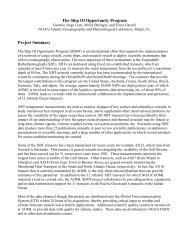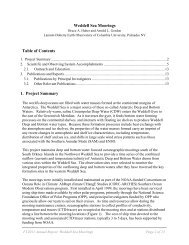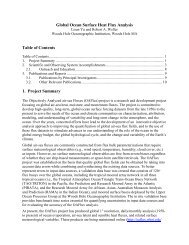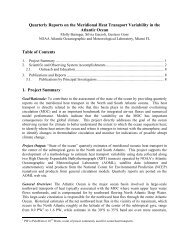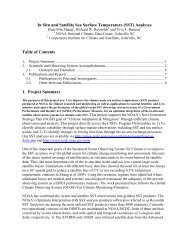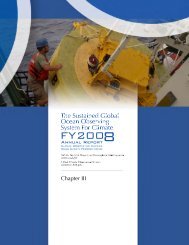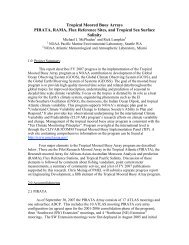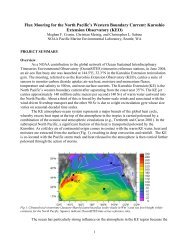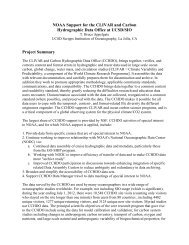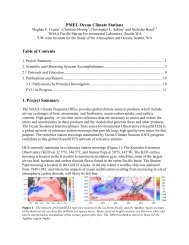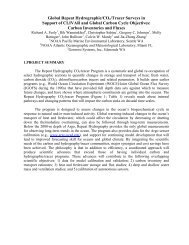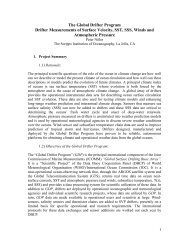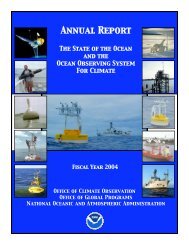GCOS Implementation Plan - WMO
GCOS Implementation Plan - WMO
GCOS Implementation Plan - WMO
You also want an ePaper? Increase the reach of your titles
YUMPU automatically turns print PDFs into web optimized ePapers that Google loves.
<strong>Implementation</strong> <strong>Plan</strong> for the Global Observing System for Climate in Support of the UNFCCC<br />
(2010 Update)<br />
Background on <strong>GCOS</strong> and the IP-04<br />
Appendix 3<br />
Origin and purpose of <strong>GCOS</strong><br />
The Global Climate Observing System (<strong>GCOS</strong>) was established, in 1992, in parallel with the<br />
negotiation of the UNFCCC, as a joint initiative of the World Meteorological Organization (<strong>WMO</strong>), the<br />
Intergovernmental Oceanographic Commissions (IOC) of UNESCO, the United Nations Environment<br />
Programme (UNEP) and the International Council for Science (ICSU). Its purpose and concept of<br />
operation are set down in the 1998 revision of the original February 1992 <strong>WMO</strong>/IOC/UNEP/ICSU<br />
Memorandum of Understanding (MOU) on <strong>GCOS</strong>.<br />
The stated purpose of <strong>GCOS</strong> is to meet the total national and international needs for comprehensive,<br />
continuous, reliable climate and climate related data and information in support of:<br />
• Climate system monitoring;<br />
• Climate change detection and attribution;<br />
• Operational climate prediction on seasonal-to-interannual time scales;<br />
• Research to improve understanding, modelling and prediction of the climate system;<br />
• Applications and services for sustainable economic development;<br />
• Assessment of the impacts of, and vulnerability and adaptation to, climate variability and humaninduced<br />
climate change;<br />
• Formulation and implementation of global, regional, national and local policy response to climate<br />
change.<br />
In particular, at the international level, <strong>GCOS</strong> is designed to support:<br />
• The specific observational needs of the World Climate Programme and related earth system<br />
science and service programs;<br />
• The climate change assessment role of the Intergovernmental Panel on Climate Change (IPCC);<br />
and<br />
• The requirements of the UNFCCC and other international conventions and agreements.<br />
The concept of <strong>GCOS</strong><br />
The concept of <strong>GCOS</strong> is defined in terms of:<br />
• Its goal;<br />
• Its objectives;<br />
• The component observing systems on which it is built; and<br />
• The systems and programs through which its objectives should be met.<br />
The goal of <strong>GCOS</strong> is to provide comprehensive information on the total climate system, involving a<br />
multidisciplinary range of physical, chemical and biological properties, and atmospheric, oceanic,<br />
hydrologic, cryospheric and terrestrial processes.<br />
The overall objective of <strong>GCOS</strong> is to support all aspects of the World Climate Programme and relevant<br />
aspects of other climate related global programmes. Its specific objectives are to provide the<br />
observations required to meet the needs for:<br />
• Climate system monitoring and climate change detection;<br />
• Research toward improving understanding, modelling and prediction of the climate system;<br />
• Assessment of the impacts of climate variability and change;<br />
• Climate information and prediction services and applications for sustainable economic<br />
development; and<br />
• Climate change policy development and implementation.<br />
136



